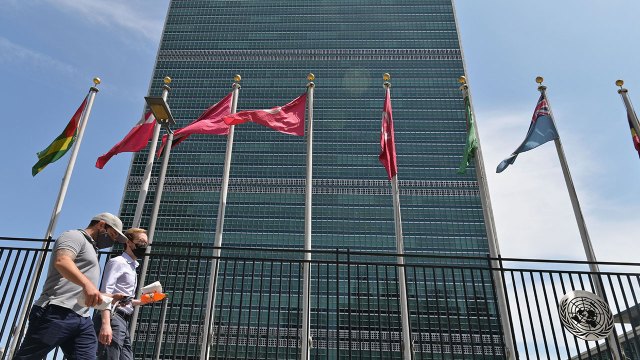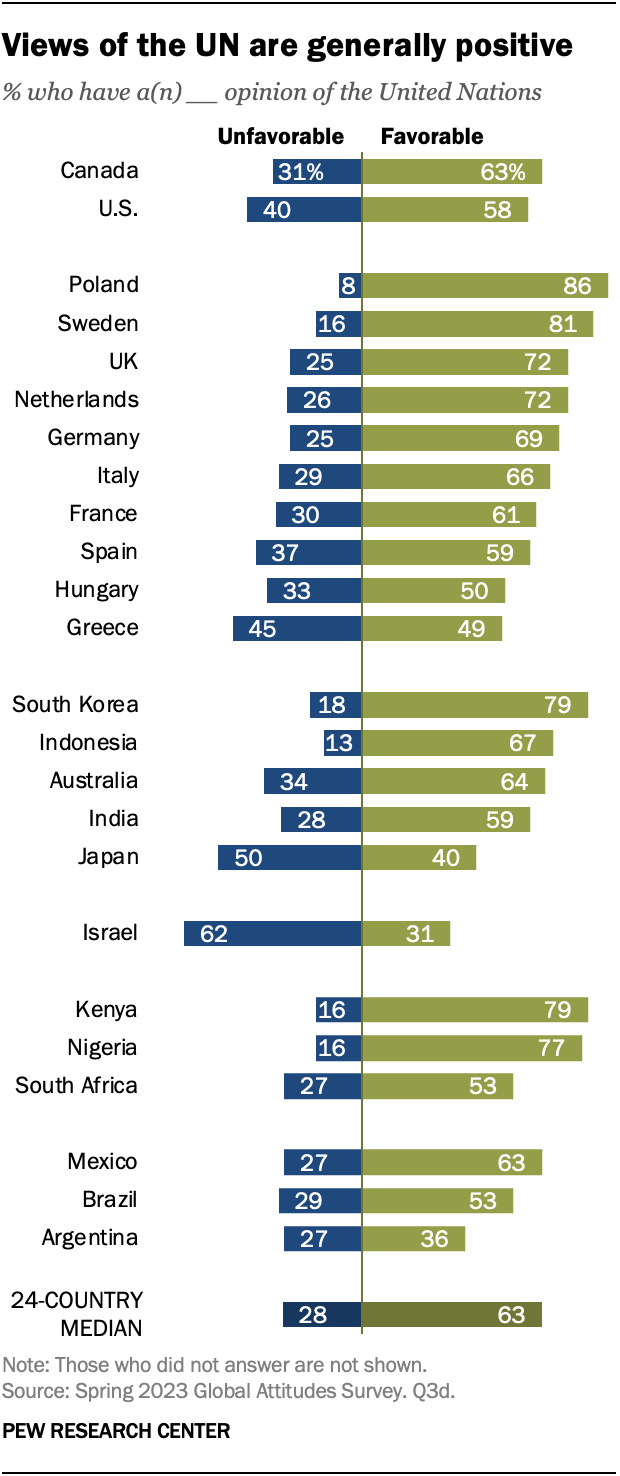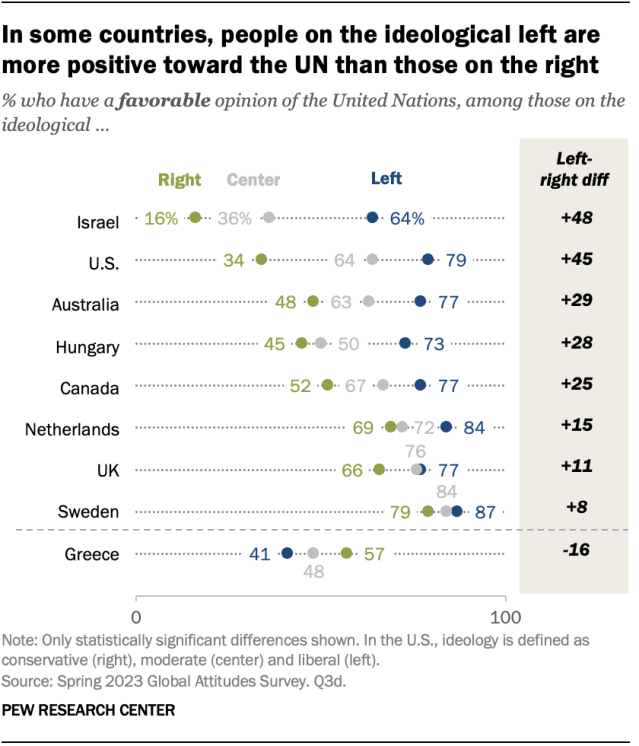
The United Nations General Assembly will open its 78th session on Sept. 5 against a favorable backdrop. A median of 63% across 24 countries surveyed see the UN in a positive light, according to a spring Pew Research Center survey. Another 28% see it negatively. In most countries surveyed, a majority of the public has a positive opinion of the UN.
This Pew Research Center analysis focuses on views of the United Nations in 24 countries in North America, Europe, the Middle East, the Asia-Pacific region, sub-Saharan Africa and Latin America. Due to the coronavirus pandemic, this is the first year since 2019 that the Center’s Global Attitudes Survey has included countries from Africa and Latin America.
For non-U.S. data, this analysis draws on nationally representative surveys of 27,285 adults conducted from Feb. 20 to May 22, 2023. All surveys were conducted over the phone with adults in Canada, France, Germany, Greece, Italy, Japan, the Netherlands, South Korea, Spain, Sweden and the United Kingdom. Surveys were conducted face-to-face in Argentina, Brazil, Hungary, India, Indonesia, Israel, Kenya, Mexico, Nigeria, Poland and South Africa. In Australia, we used a mixed-mode probability-based online panel.
In the United States, we surveyed 3,576 adults from March 20 to 26, 2023. Everyone who took part in this survey is a member of the Center’s American Trends Panel (ATP), an online survey panel that is recruited through national, random sampling of residential addresses. This way, nearly all U.S. adults have a chance of selection. The survey is weighted to be representative of the U.S. adult population by gender, race, ethnicity, partisan affiliation, education and other categories. Read more about the ATP’s methodology.
Here are the questions used for the analysis, along with responses, and the survey methodology.

Views of the UN are especially favorable in Kenya, Poland, South Korea and Sweden, where about eight-in-ten express positive views.
In a few countries, however, negative opinions of the UN are more common than positive ones. In Israel, for example, 62% have a negative view of the organization, the highest share across all countries surveyed. The Israeli public has historically expressed unfavorable views toward the UN: At least 58% have viewed the organization negatively since this question was first asked in 2007.
Similarly, 50% of people in Japan have an unfavorable view of the UN. Japanese views of the UN have stayed generally negative since the summer of 2020, when 55% had an unfavorable view of the organization.
In a handful of countries – Argentina, Brazil, Indonesia and South Africa – about a fifth or more of the public did not provide an opinion.
Favorable opinions of the UN over time

The UN’s favorability has generally remained stable across most countries surveyed in recent years, with a few exceptions.
In Hungary, where government leaders have expressed frustration with international criticism of domestic affairs, positive opinion has dropped 11 percentage points in the last year, to 50%. And in the U.S., favorable views have ticked down slightly to 58%. Conservative Americans, as well as adults ages 50 and older, are less likely to see the UN favorably than they were in 2022.
While data is available for most countries from 2022, the Center was unable to survey several middle-income countries from 2020 to 2022 due to the COVID-19 pandemic. However, looking at changes from 2019 to 2023, opinions of the UN have improved significantly in some of these countries. In Nigeria, India and Kenya, for example, the shares who have favorable views of the multilateral organization have increased by double-digit points since 2019.
The 17-point increase in India may be due, in part, to the rise in the share who express any opinion. Just 12% did not respond to the question in 2023, compared with 44% in 2019.
What do people like about the UN?
In past surveys, publics have tended to credit the UN for promoting human rights, peace and economic development, while fewer have said it cares about the needs of everyday people or deals effectively with international problems.
In a 2020 Center survey, a median of 76% across 14 countries believed the UN promoted human rights, while a median of 51% said it dealt effectively with international problems.
Differing views of the UN within countries

In some countries, people who place themselves on the ideological left are more favorable toward the UN than those on the right. This pattern was also observed in 2022.
The divide is particularly stark in Israel, where those on the left are almost 50 points more likely to hold a positive opinion of the UN than those on the right. And Israelis on the left have grown even more favorable toward the organization over the past year: In 2022, 48% of those on the left had a positive opinion of the UN, compared with 64% who have the same view this year.
In the U.S., liberals are also much more likely than conservatives to see the UN positively (79% vs. 34%).
Only in Greece is the pattern reversed: 57% of people on the ideological right view the UN favorably, compared with 41% on the left.
In a handful of countries, people with more education are more likely than those with less education to see the UN favorably. In Germany, for example, 78% of those with at least a postsecondary education approve of the UN, compared with 64% of those with a secondary education or less.
Note: This is an update of a post originally published on Sept. 17, 2021. Here are the questions used for the analysis, along with responses, and the survey methodology.



